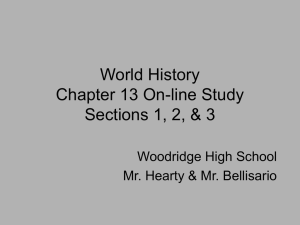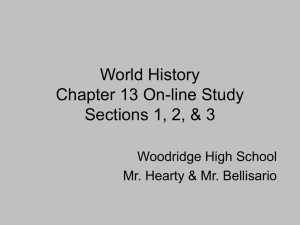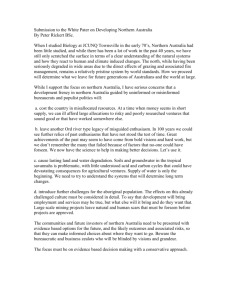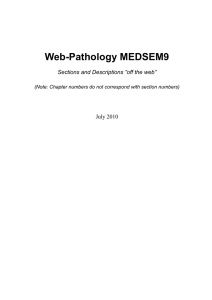Zoom-in The world speaks English
advertisement
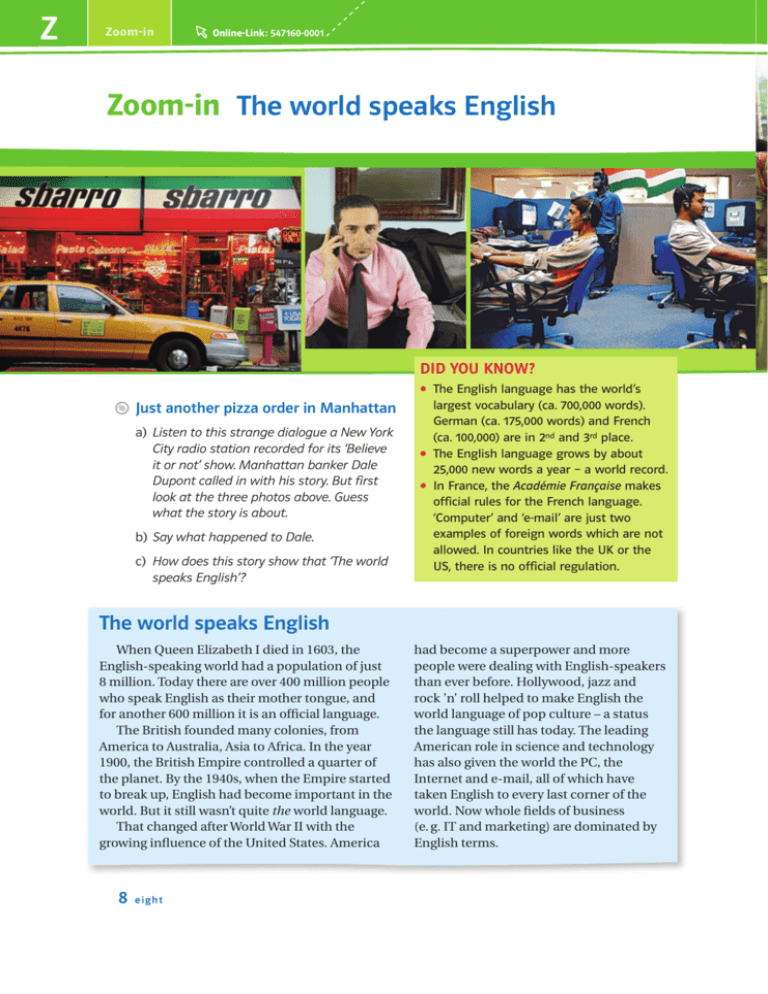
Z Zoom-in Online-Link: 547160-0001 Zoom-in The world speaks English DID YOU KNOW? • The English language has the world’s C Just another pizza order in Manhattan a) Listen to this strange dialogue a New York City radio station recorded for its ‘Believe it or not’ show. Manhattan banker Dale Dupont called in with his story. But first look at the three photos above. Guess what the story is about. b) Say what happened to Dale. c) How does this story show that ‘The world speaks English’? • • largest vocabulary (ca. 700,000 words). German (ca. 175,000 words) and French (ca. 100,000) are in 2nd and 3rd place. The English language grows by about 25,000 new words a year – a world record. In France, the Académie Française makes official rules for the French language. ‘Computer’ and ‘e-mail’ are just two examples of foreign words which are not allowed. In countries like the UK or the US, there is no official regulation. The world speaks English When Queen Elizabeth I died in 1603, the English-speaking world had a population of just 8 million. Today there are over 400 million people who speak English as their mother tongue, and for another 600 million it is an official language. The British founded many colonies, from America to Australia, Asia to Africa. In the year 1900, the British Empire controlled a quarter of the planet. By the 1940s, when the Empire started to break up, English had become important in the world. But it still wasn’t quite the world language. That changed after World War II with the growing influence of the United States. America 8 eight had become a superpower and more people were dealing with English-speakers than ever before. Hollywood, jazz and rock ’n’ roll helped to make English the world language of pop culture – a status the language still has today. The leading American role in science and technology has also given the world the PC, the Internet and e-mail, all of which have taken English to every last corner of the world. Now whole fields of business (e. g. IT and marketing) are dominated by English terms. Zoom-in Now take a tour of four big English-speaking countries. INDIA Population: 1.1 billion (2nd in the world after China) Area: 3.1 million sq. km (7th) “ Independent from Britain since: 1947 c Namáste! I’m from India, the world’s largest democracy. My country is rich in culture and tradition. English is not the mother tongue of most Indians – there are over 20 other languages as well as many dialects of the main language, Hindi. But English is used a lot in government and business. Especially in the IT industry, India has become a huge success story. Foreign businesses see the great possibilities of the millions of English-speaking workers. But so far, only a small number of people in just a few regions of the country have felt our new success. Most Indians have not seen a change in their standard of living. India is still a very poor country. Many people who love our Indian culture never actually go to India and see the poverty in the streets and in the country. But they needn’t travel so far to enjoy what they like most about the country – food, music and films. In Britain, Indian food has become so popular over the years that in a survey, Britons said that chicken tikka masala was their favourite dish, not fish-and-chips! And our Bollywood films with their love stories have millions of fans everywhere in the world. ” nine 9 Z Z Zoom-in CANADA Population: 33 million (36th in the world) Area: 9.9 million sq. km (2nd) Independent from Britain since: “ Legal independence in 1982 c Hi! For me, Canada is forests, tundra, the Rocky Mountains, and big cities with big skyscrapers. But there is a strong European feeling, too: Canada has a large French-speaking population (Québec was a French colony first) and the British monarch’s portrait on Canadian money is just one reminder that Canada and the UK still share the same head of state. For tourists it is often surprising how some places in British Columbia and Québec can look, sound and feel almost more British than Britain or more French than France. SOUTH AFRICA Population: 47 million (26th) Area: 1.2 million sq. km (25th) Independent from Britain since: 1910 ” “ c 10 ten Howzit! In 1994, in my country’s first free elections, our civil rights leader Nelson Mandela became South Africa’s first black president – after 27 years in prison. Mandela had been the great figure in South Africa’s fight against white South Africa’s racist apartheid (‘separateness’) system. Apartheid kept control of the country in the hands of the small 10 % white minority. Going from a police state to a free society has gone surprisingly well, although poverty and crime are huge problems for us. The white minority still controls much of my country’s wealth, and many of us blacks still live in poverty in the crowded townships. But a new black middle class is slowly growing. ” Online-Link: 547160-0002 Zoom-in AUSTRALIA Population: 21 million (53rd in world) Area: 7.7 million sq. km (6th) Independent from Britain since: 1901 (British monarch still head of state) “ c G’day! Let me tell you something about my country, Australia. Lots of visitors to Australia love the endlessness of the dry outback, where you can drive for days without seeing another car. The same visitors are sometimes surprised to see just how much of the country is covered by rainforests, too. But deserts and rainforests aren’t the best places for settlement. That’s why most people live on or near the coasts, and that’s where the big cities have grown. Now 85 % of us Aussies live in cities. The outback is the home of Australia’s indigenous population, the Aboriginals. These Australians had already been living on the continent and developing their unique culture for over 40,000 years before the British began settling here in 1788. There was systematic killing of Aboriginals, and forced relocation tore families apart. During the 19th century, Aboriginal culture was almost destroyed. Relations have improved a lot over the past years, and in 2008 the Australian government apologized to the Aboriginals for past crimes. For beach fans like me, Australia’s the perfect place with its warm climate and beautiful coasts! But huge holes in the ozone layer mean a much higher risk of getting skin cancer. So at the beach, people wear more clothes than you would ever see on European beaches. Australia has been a continent for 50 million years, completely separated from the rest of the world, so it’s no wonder that Australia’s animal world has become unique. Platypuses, koalas and kangaroos (we call them roos ) are just a few of the animals you can only find ‘down under’. ” eleven 11 Z


